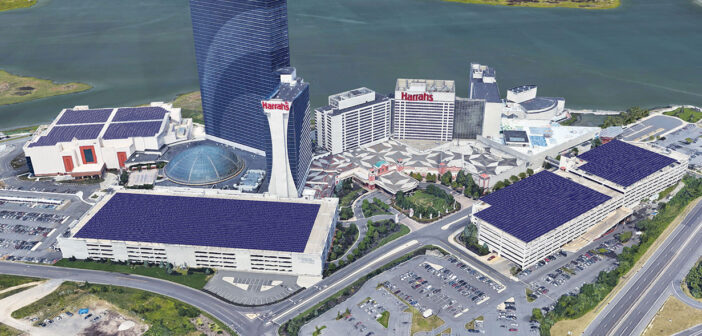The three Caesars Entertainment Inc. properties in Atlantic City will soon harness the power of the sun via an 8.4 MWh solar portfolio, which will help the company reduce its carbon footprint.
The portfolio includes two solar canopies (1.7 MWh and 886 kWh) at Caesars Atlantic City; two canopies (1.93 MWh and 1.94 MWh) and a 913 kWh rooftop system at Harrah’s Resort Atlantic City; and a 1.01 MWh canopy at the Tropicana Atlantic City.
“The portfolio will generate approximately 10,425,453 kilowatt hours per year of clean, renewable energy,” said Dan O’Brien, VP direct origination, DSD Renewables, which developed and financed the installations, and will serve as long-term owner and operator of the systems. “The renewable energy generated is expected to avoid 8,144 tons of carbon dioxide (CO2) annually, the equivalent to removing 1,592 gas-powered cars from the road each year or planting 122,167 trees.”
The solar portfolio will also move Caesars Entertainment toward its goal of reducing its greenhouse gas emissions by 100% before 2050 as part of its People, Planet, Play framework.
“Caesars Entertainment has a longstanding commitment to the environment and was one of the first companies in the entertainment industry to establish greenhouse gas reduction goals that align with science,” said Eric Dominguez, SVP engineering & asset management, Caesars Entertainment. “Integrating solar energy into the company’s supply mix is a natural extension of ongoing efforts to tread lighter on the planet. Caesars is evaluating opportunities for both on-site and utility-scale solar projects across its portfolio, and Atlantic City made perfect sense as a host location given New Jersey’s commitment to incentivizing cleaner energy resources.”
Besides the environmental impact on the properties and the community, the solar portfolio provides many other advantages on-site, noted O’Brien.
“The PV solar canopies will provide covered parking that will protect guest and employee vehicles, and the parking decks from the elements,” he said. “The coverage provided by the canopies will also aid in water management, snow removal and overall garage deck lifetimes.”
He pointed out that the solar system will be used for general use at the entire facility, as opposed to certain electrical circuits or operations.
“New Jersey is a net metering state, which means that the state requires PV solar systems to be installed behind an electrical meter,” said O’Brien. “This allows for the system to produce power that can be consumed directly on-site or pushed back on to the grid. The latter instance occurs when the system is generating more power than a facility is actively consuming at that time.”
Schenectady, NY-based DSD will own and operate the systems for 15 years, and will utilize tax benefits through its financing structures with tax equity partners. “The tax benefits are then reflected in the lower PPA [power purchasing agreement]rates Caesars will be paying for the electricity produced.”
The fact that the canopies will be placed on top of parking garages present some challenges as DSD had to coordinate the installation so that there would be little to no guest impact during construction.
“DSD had to consider not only the engineering logistics, but also the fact that these would be installed in active parking lots,” said O’Brien. “We designed the arrays in such a way to minimize impact, not only during construction, but also to ensure the array would not take away needed parking spaces or introduce obstructions. DSD’s patented and patent-pending engineering designs allow us to create a unique solution to maximize coverage while minimizing impact on the existing parking lot footprint.”
Caesars, Dominguez shared, talked to a number of solar developers before choosing DSD. He noted that “DSD was identified as the best partner to align with based on their track record, product offering, references and scalability. DSD has proven to be a great partner and Caesars looks forward to working with them on additional opportunities to bring more on-site solar energy to its portfolio.”
His company is no stranger to solar, having installed solar panels at Harrah’s Cherokee Valley River in Murphy, NC, and Harrah’s Resort Southern California in Valley Center, CA. Domiguez expects more Caesars properties to “go solar.”
“Solar-covered parking was recently installed at Harrah’s Pompano Beach,” he said. “Caesars is also actively evaluating solar project opportunities in its Illinois, Maryland and Nevada markets. The future is bright for solar energy at Caesars Entertainment as the company continues its journey to reducing environmental impact.”




